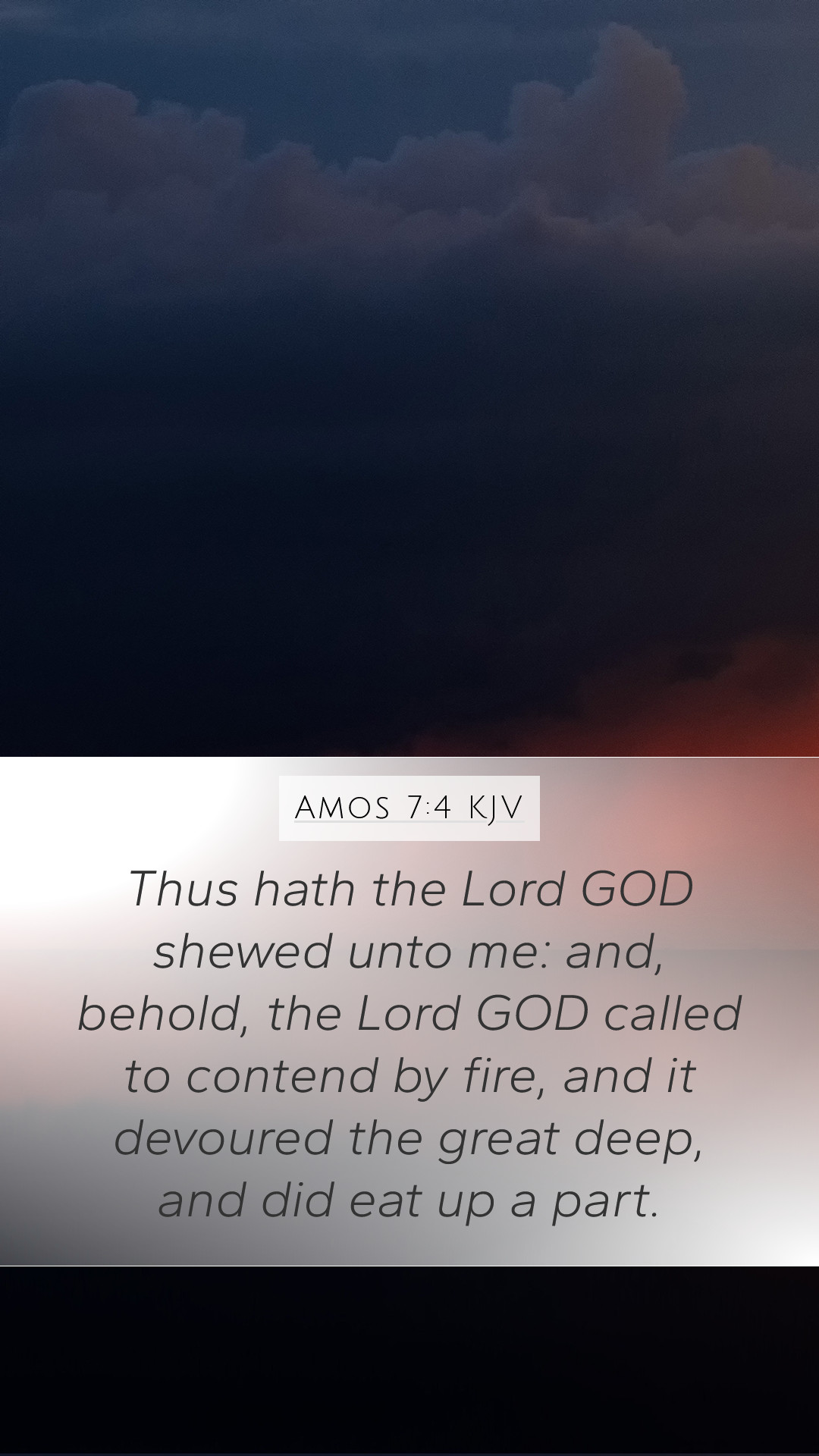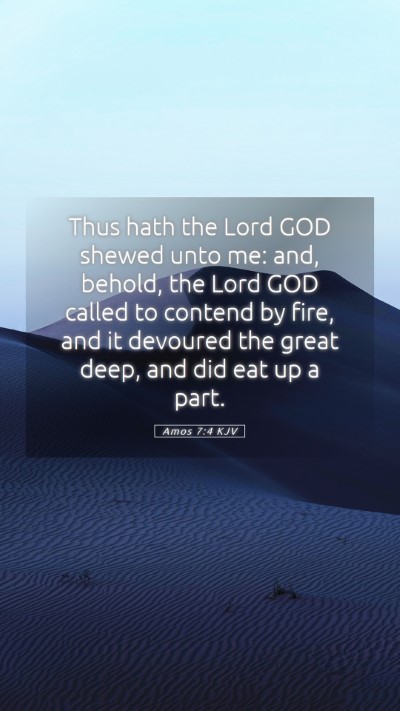Old Testament
Genesis Exodus Leviticus Numbers Deuteronomy Joshua Judges Ruth 1 Samuel 2 Samuel 1 Kings 2 Kings 1 Chronicles 2 Chronicles Ezra Nehemiah Esther Job Psalms Proverbs Ecclesiastes Song of Solomon Isaiah Jeremiah Lamentations Ezekiel Daniel Hosea Joel Amos Obadiah Jonah Micah Nahum Habakkuk Zephaniah Haggai Zechariah MalachiAmos 7:4 Meaning
What is the meaning of Amos 7:4?
Thus hath the Lord GOD shewed unto me: and, behold, the Lord GOD called to contend by fire, and it devoured the great deep, and did eat up a part.
Amos 7:4 Bible Verse Meaning
Understanding Amos 7:4
Amos 7:4 states:
“Thus hath the Lord God shewed unto me; and, behold, the Lord God called to contend by fire, and it devoured the great deep, and did eat up a part.”
Overview of the Verse
This verse is part of a series of visions that the prophet Amos received from God. In this vision, God communicates a dire warning about impending judgment through the imagery of fire. The deep signifies something vast, possibly representing the depths of the sea or the foundation of the earth, and the fire symbolizes God's judgment consuming everything in its path.
Commentary Insights
-
Matthew Henry’s Commentary:
Henry focuses on the imagery of fire, interpreting it as indicative of God's fierce judgment upon sin. He notably emphasizes the seriousness of God's intentions and the complete destruction this divine judgment entails. Henry also points to the consuming nature of fire indicating that nothing is left unscathed by God's judgment.
-
Albert Barnes’ Notes:
Barnes highlights the contextual significance of Amos’ role as a prophet delivering warnings to Israel. He elaborates on the nature of God's communication, wherein God employs vivid imagery to convey the urgency of His message. Barnes compares the vision of fire to other Biblical instances of judgment, rooting the understanding of this verse in the broader narrative of God's interaction with His people.
-
Adam Clarke’s Commentary:
Clarke stresses that the fire depicted symbolizes divine wrath and retribution. He discusses how the consuming fire metaphor aligns with the themes found throughout the prophetic literature in the Old Testament. Clarke also notes the importance of realizing how the nature of God’s judgment is not arbitrary but stems from His justice and holiness.
Significance of the Imagery
The imagery of fire is crucial in prophetic literature, as it conveys both destruction and purification. Amos, acting as a mouthpiece for God, relays a powerful image of divine scrutiny. This vision illustrates the stark reality that the depths—which can symbolize rebellion against God—will be subject to His righteous wrath.
Application to Daily Life
For modern readers seeking bible study insights, this verse serves as a profound reminder of the holiness and justice of God. It encourages introspection and a reevaluation of personal conduct, reminding believers that God's judgment can arise due to unrepented sin. It emphasizes the importance of aligning oneself with God's will to avoid the consequences of judgment.
Related Bible Verses
- Isaiah 30:27: "Behold, the name of the Lord cometh from far, burning with his anger, and the burden thereof is heavy."
- Jeremiah 23:29: "Is not my word like as a fire? saith the Lord; and like a hammer that breaketh the rock in pieces?"
- Matthew 3:12: "Whose fan is in his hand, and he will thoroughly purge his floor, and gather his wheat into the garner; but he will burn up the chaff with unquenchable fire."
Further Thoughts
In examining such verses through bible verse commentary, believers can gain a deeper appreciation for the character of God as portrayed in the Old Testament. Through historical context of Bible verses, the role of prophets like Amos becomes clearer, and the hunger for a relationship with God may prompt one to seek further understanding of Scripture.
Conclusion
This verse invites a thoughtful approach to biblical exegesis, shedding light on God's intention to communicate seriousness about sin and judgment. It serves as an exploration of meaning of Bible verses in a wider context, inspiring an ongoing quest for God’s wisdom in contemporary life.


